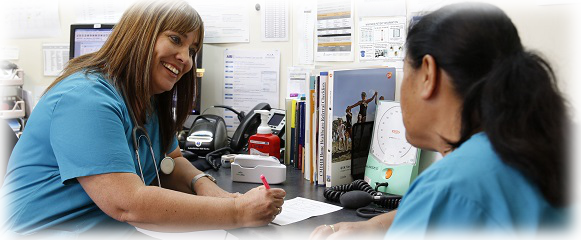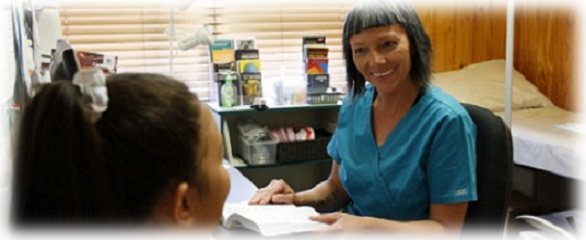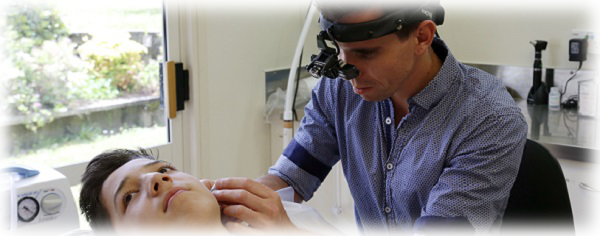December 2014 News
Warm Christmas Greetings to the Millhouse Community and to other readers:
think summer is finally here!
November has been reported as one of the coldest on record and this is reflected in the number of ongoing respiratory infections we have seen. There have been no official reports but I wonder if the selected viral strains in the 2014 flu vaccine did not match the current influenza infections we have experienced this year.
In this issue...
- Changing Seasons
- Farewell Dr Lily
- Welcome Dr Viji and Dr Therese
- At Risk Individual programme
- Pressure on Nurse Team
- E-appointments
and this month Dr Ric writes more about Food and Bugs in the Gut
Christmas is nearly upon us and the warmer weather with
frequent rain showers has been beneficial for the
vegetable gardeners. The supermarkets are loaded with
produce but there is something therapeutic
about breaking up the garden clods of dirt in your hands, planting seeds in rows and later harvesting organically grown fresh fruit and vegetables. It is also a delight picking a fresh tomato, even if it is growing in a pot. In August 2010 I discussed how caring daily for a pot plant can have beneficial effects on health, so get gardening this summer.
Millhouse News
We have had a number of recent changes to the medical team.
Dr Lily covered Dr Stephanie during her maternity leave and continued with us during 2014. I encouraged her to undertake a year of focused training which she has decided to do, and we wish her every success in her future general practice career.
Dr Viji Naranyanan has replaced Dr Scott and is working Monday, Wednesday and Friday. We welcome Dr Viji to the medical team; she brings an expertise in skin conditions, with advanced skills in the removal of skin cancers, and also appearance surgical procedures. Dr Viji also has an interest in women's health and is fluent in English, Tamil and Malayalam.
Dr Therese Khella is returning at the end of January, working Tuesday and Thursday, thus complementing Dr Viji's days. Dr Therese, as many of you know, is a skilled family practitioner who has a special focus in women's and children's health. She is also fluent in English and Arabic.
Drs Viji and Therese will be based at 130 Millhouse with Dr Aileen.
At-Risk-Individual programme (ARI)
Patients report that undertaking the 'Partners in Health' questionnaire and developing focused health goals with the Practice Nurse has been a rewarding experience. This also includes encouragement by the medical team to explore improved lifestyle choices, which include eating nutritious meals, undertaking regular exercise and accessing community and specialist support.
We have enrolled existing CCM patients in the ARI programme, as well as those who have had a recent hospital admission or serious illness. Elderly people on multiple drugs may be at increased risk of falls and complications of therapy, so we are accessing the expertise of the East Health PHO pharmacist in reviewing these medications, and reducing the number taken if that is possible.
In the new year we want to encourage the many prediabetics - those whose hba1c falls between 45 and 49, greater than 50 means you already have diabetes - to adopt healthy goals. Prediabetics, like diabetics, have an increased risk of cancer, heart disease, arthritis and Alzheimer disease; the last condition will affect 50% of those who live beyond 80.
Why not adopt health-promoting goals in 2015 which prevent the onset of early illness?
Pressure on Nurse Team
Email communication for results have been welcomed by patients but we are now receiving more and more follow-up nurse phone consultations asking for additional explanations. This is preventing our practice nurses from attending to more urgent clinical work. In 2015 we will dialogue with you about whether we continue emailing all results, or send only the abnormal, as well as communicating by text.
E-appointments
Don't forget E-appointments which are being used more and more. It is an easy and convenient way to book an appointment on line at www.millhousemedical.co.nz allowing you to select your doctor and the appointment time.
This Month - More about the Gut, the Microbiome, and Probiotics to improve health.
In the last two newsletters I discussed the importance of microorganisms that colonise the gastrointestinal tract, stimulating the development of our first line defence 'innate' immunity. Each one of us has a unique fingerprint of bugs that we initially receive from our mother's vaginal secretions and breast milk; these bugs are nourished by wholesome and fermented foods, but destroyed by antibiotics which can lead to an overgrowth of harmful microorganisms, also affected by a processed refined sugar-starch diet.
I also presented evidence that obesity may be caused by particular gut bacteria that flourish when a processed refined diet is eaten, whereas slimness appears linked to having Bacteroidales species resident in the gut. In patients with Irritable Bowel and Inflammatory Bowel Disease (Colitis, Crohn's) I suggested that a trial elimination of fermentable carbohydrate foods may lead to remission.
The complexity of the gastrointestinal microorganisms is one of the last frontiers of human biology to be unravelled, and may also include protective effects from resident viruses in the bowel. Recently Dr Ken Cadwell from New York University observed that when mice were initially inoculated with the Norovirus (which we associate with outbreaks of infectious diarrhoea) and were later given pathogenic bacteria, the animals were found to be protected from developing the bacterial disease.
Probiotics (live good bacteria supplements) may prevent childhood eczema
In 1989 Dr David Strachan from the University of London offered an explanation for the increasing incidence of asthma, hayfever and eczema that had occurred in Western countries over previous decades and suggested this was due to the lack of early and repeated exposure to allergens; he suggested this was caused by "declining family size, improvements in household amenities, and higher standards of personal cleanliness'. Other changes which I have already mentioned such as increasing use of antibiotics, higher Caesarean section birth rate and less breast feeding also affect gut microorganisms and immunity. Later researchers would refer to this as the 'hygiene hypothesis' of allergic disease where the lack of exposure to allergens and microorganisms early in life predisposes to hypersensitivity conditions. tudies on infants in Estonia demonstrated less allergic disease, compared with the more modern Sweden, with higher levels of good lactobacilli in the Estonian-faeces. This was the stimulus for researchers to supplement mothers in the last weeks of pregnancy and babies early in infancy with the probiotic Lactobacillus rhamnosus (available as Inner Health Eczema Shield). A number of trials have demonstrated a lower the incidence of infantile eczema till age 4 and possibly a reduction in respiratory allergies .
Probiotics preventing antibiotic diarrhoea
Lactobacilli species boost immunity, accelerate the digestion of milk sugar and strengthen the gut barrier. The bacteria, named for its lactic acid excretion, has an inhibitory effect on other bugs. This is useful in treating acute infectious diarrhoea, especially which caused by antibiotic medication, and will preventing the overgrowth of harmful bacteria. Consider supplementing with lactobacillus rhamnosus and saccharomyces boulardi (available as Inner Health Gastro Relief).
Power of the Poop – faecal donor enemas
Lactic acid producing bacteria however represent only 5% of the gut microbiome and there are up to 1000 other bacteria species in the gastrointestinal tract. In 1958 Dr Ben Eiseman and his colleague from Colorado reported treating four people critically ill with pseudomembranous colitis, who had failed antibiotic, probiotic and other medical therapies. They were successfully treated using faecal enemas obtained from a healthy person's stool specimen. This severe inflammatory bowel disease is caused by the hospital superbug clostridia difficile which carries a high mortality and commonly occurs with long-term antibiotic therapy. In the last decade there have been a number of reports on the effectiveness of faecal microbiota transplantation, a fancy name for a donation of poop which contains a myriad of microorganisms. The poop is placed as an enema in the rectum or higher in the bowel during colonoscopy, eradicating clostridia difficile infection.
Professor Tom Borody, a Sydney gastroenterologist using faecal transplantation, has also observed resolution in severe cases of Crohn's and Ulcerative Colitis. There are now reports that faecal microbiota transplants may be helpful in treating difficult Irritable Bowel disease and chronic constipation, as well as having possible beneficial effects when used with autoimmune disease such as Rheumatoid Arthritis, Multiple Sclerosis and Parkinson's disease.
The largest source of toxic material is in the colon. If the protective luminal bacterial biofilm is destroyed, the single-cell-thick gut wall is penetrated, the enteric immune response fails and we will develop disease. Eating a diet that stimulates healthy gastrointestinal microorganisms will go a long way in helping prevent disease and keeping you well.
FOODS for a HEALTHY BOWEL
Foods that nourish a healthy bowel are fibre rich, highly coloured fresh vegetables & fruits and whole grains. Prebiotic foods that stimulate healthy lactic acid producing bacteria include:
Acacia gum, chicory root, Jerusalem artichoke, dandelion greens, garlic, leeks, onions, asparagus, wheat bran
Foods that contain friendly lactic acid bacteria include:
Pickled vegetables, fermented bean paste such as tempeh, miso, kefir, buttermilk, kimchi, sauerkraut, soy sauce.
Yoghurts are best homemade and eaten fresh. By the time commercial yoghurt reaches the supermarket most of the healthy bugs have already died.
The best way to re-inoculate the colon is using a stool specimen from a healthy young infant who has not been on antibiotics.
May you experience a happy and relaxing festive season.
Yours in good health
Dr Richard J Coleman








